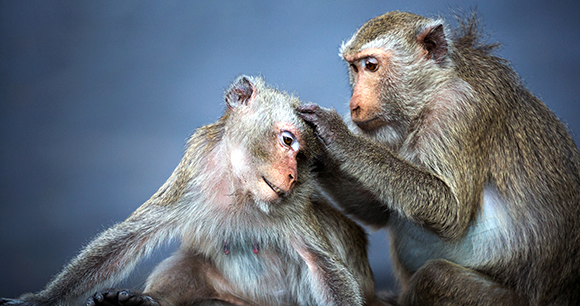Monkeying Around as Enrichment: Using Caregivers to Provide Social Enrichment to Macaques in Research
by Rachel van Vliet, MSc student, McGill University; Dr. Nadège Aigueperse, researcher, National Research Institute for Agriculture, Food and Environment; Dr. Elsa Vasseur, associate professor, McGill University
Enrichment is pivotal to captive animal welfare. Social enrichment is particularly important for any social animals who, due to practical constraints, are not housed in larger groups. Pair housing is the most common social housing type for macaques in laboratories across North America. This does allow for some degree of socialization, but falls well short of what their wild counterparts experience within typical groups of 30–80 monkeys. The goal of our project, which was funded by an AWI Refinement Grant, was to see if laboratory caregivers could act as an additional source of social enrichment to pair-housed macaques in research.

We set out to see if additional time spent with the monkeys would positively impact them, and what type of interactions would benefit them most. Ten adult rhesus and six adult cynomolgus macaques, housed in pairs, were enrolled in the study; only one focal animal per pair was observed. Each day, for a three-week period, caregivers would spend six minutes engaging with the monkeys during their regular afternoon feeding (two minutes each before, during, and after feeding). Caregivers engaged with half the monkeys via human behaviors (HB)—using human body language and speaking softly. Caregivers mimicked monkey behavior (MB) to engage with the other half, all the while avoiding eye contact or speaking (behaviors the macaques could perceive as aggressive).
Our results showed that monkeys were more likely to engage in interactions before feeding, indicating that this may be an ideal time to provide social enrichment. During the interactions, monkeys in the HB group interacted more with the caregivers, showing higher rates of affiliative and submissive behaviors, but also higher rates of abnormal behavior (e.g., pacing, plucking hair) than monkeys in the MB group. Throughout treatment application, monkeys from both groups spent most of their time oriented toward the caregivers and at the front of their cages, showed a 2.2 percent increase in time spent self-grooming, and a 3.4 percent reduction in time spent interacting negatively with their cagemates across the three weeks of treatment (p < 0.10).
In order to assess long-term treatment effects, we analyzed grooming and social behaviors when no humans were present and compared the three weeks of treatment application to three weeks before and after. Results showed that while HB monkeys did indeed have higher rates of certain abnormal behaviors, monkeys from both groups showed a 3.5 percent decrease in the frequency of cage-directed abnormal behaviors (e.g., cage biting) from before to after treatment and a 1.2 percent decrease in the frequency of stereotypic abnormal behaviors (e.g., abnormal postures) from treatment to after. In addition, all monkeys saw a 12.5 percent increase in the proportion of time spent interacting positively with cagemates, including a 10.6 percent increase in time spent grooming each other from before to after treatment. Conversely, they displayed a 0.7 percent decrease in time spent interacting negatively (primarily through aggressive interactions) from treatment to after (p < 0.10).
We were not able to distinguish if either treatment was preferred, though monkeys seemed more responsive during human-behavior interactions (though negative impacts were also identified). Overall, we can conclude that macaques housed in pairs can benefit from additional unstructured interactions with their human caregivers.
This study was funded by the AWI Refinement Research Award program. Learn more about this program or view additional studies.
Program Terms: Animals in Laboratories
AWI Quarterly Terms: Feature Article
Related News
New Analysis: Animal Welfare Act Enforcement Deteriorates Following SCOTUS Ruling
In Program: Animals in LaboratoriesThe US Department of Agriculture, long known for its lackluster enforcement of the Animal Welfare Act (AWA), appears in recent years to have drifted even...
AWI Statement on Trump Administration’s Plan to Reduce Animal Experimentation Amid Attack on Science
In Program: Animals in LaboratoriesThe Animal Welfare Institute (AWI) applauds recent announcements by the National Institutes of Health and the US Food and Drug Administration about their plans to reduce the use of...
AWI Scholarship Winners Campaign for a Better World for Animals
In Program: Animals in Laboratories, Farmed AnimalsThe Animal Welfare Institute (AWI) announced today the 12 winners of a scholarship designed to invest in future leaders who seek to improve the lives...
AWI Supports Phasing Out Animal Use in Research and Testing, but Proper Planning is Essential to Protect Animals and Science
In Program: Animals in LaboratoriesLast month, both the National Institutes of Health and the US Food and Drug Administration announced plans to phase out the use of animals in...